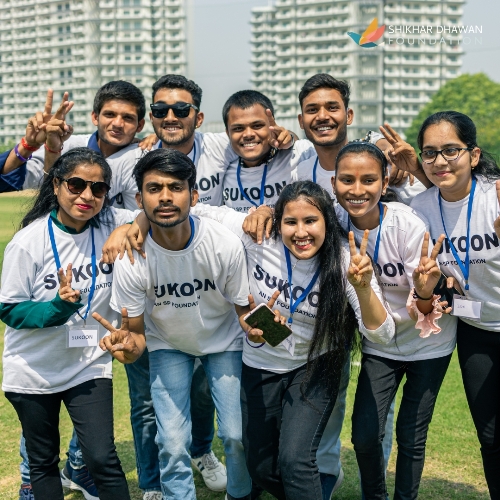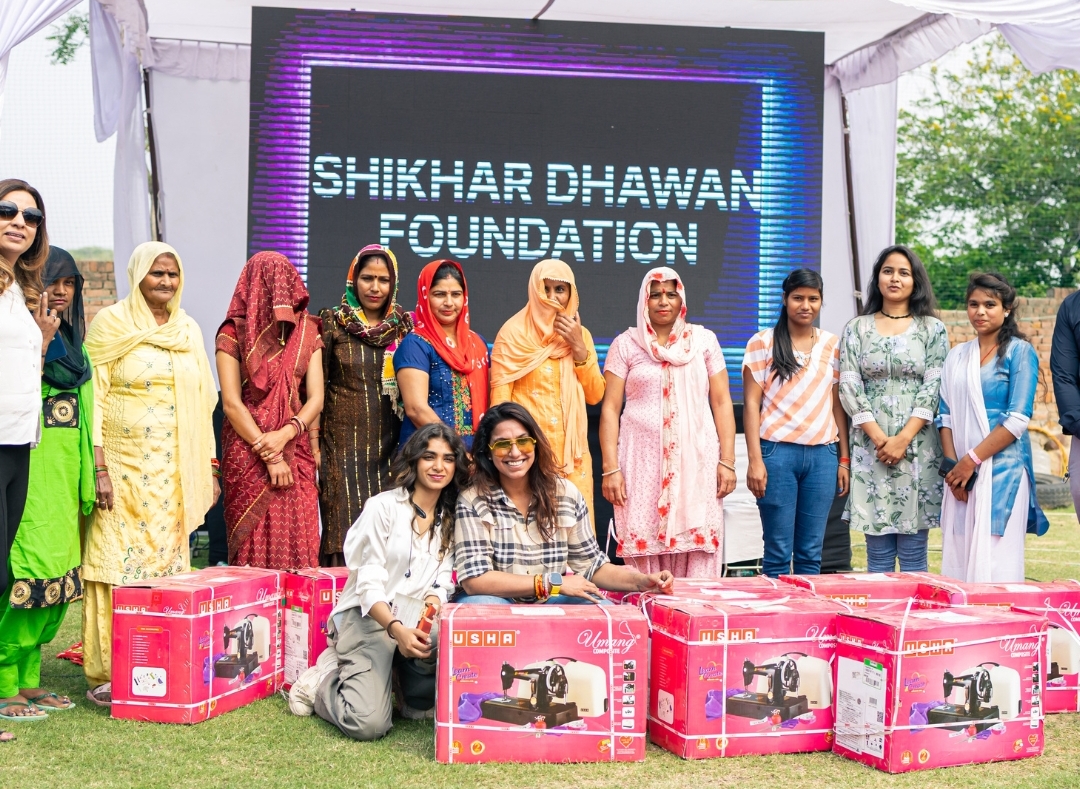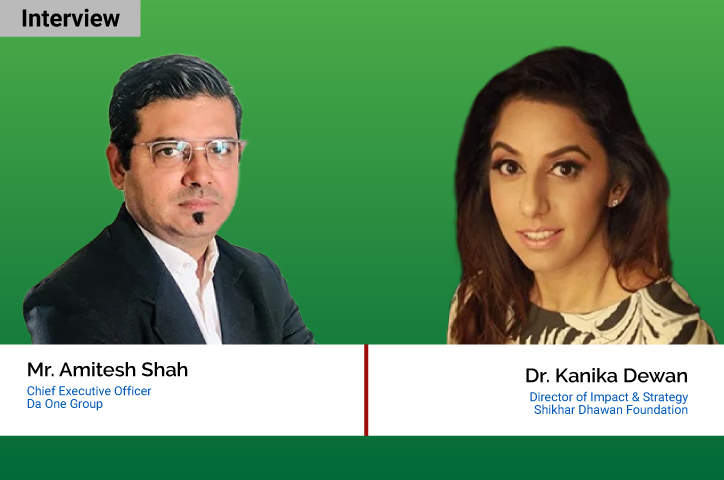 In a short span of time, Shikhar Dhawan Foundation (SDF) has firmly established its presence in the realm of social impact. Founded just last year by renowned cricketer Shikhar Dhawan, SDF's mission centres around empowering NGOs and bolstering local development endeavours including its "Impact 11" initiative spanning education, skill development, health, environment, sports, and more. In an exclusive exchange with TheCSRUniverse, Mr. Amitesh Shah, CEO of Da One Group, and Dr. Kanika Dewan, Director of Impact & Strategy, SDF, delve into the foundation's goals, its transformative methodologies, and the tangible positive changes it is instigating within communities.
In a short span of time, Shikhar Dhawan Foundation (SDF) has firmly established its presence in the realm of social impact. Founded just last year by renowned cricketer Shikhar Dhawan, SDF's mission centres around empowering NGOs and bolstering local development endeavours including its "Impact 11" initiative spanning education, skill development, health, environment, sports, and more. In an exclusive exchange with TheCSRUniverse, Mr. Amitesh Shah, CEO of Da One Group, and Dr. Kanika Dewan, Director of Impact & Strategy, SDF, delve into the foundation's goals, its transformative methodologies, and the tangible positive changes it is instigating within communities.
Scroll down to read the full interview.
Q&A
Q. What drove Shikhar Dhawan Foundation to strengthen NGOs and civil society groups, and how does this align with its community development goals?
Amitesh Shah (AS): Shikhar Dhawan Foundation recognized the unique insights held by NGOs and Civil Society Organizations within communities. Their ability to address pressing social issues drove us to enhance their capacities for greater impact. This collaborative approach aligns with our mission of inclusive development, allowing us to tackle various causes like women's empowerment, livelihood creation, environment, healthcare, and education. Through strategic collaboration, we magnify their efforts and bring about lasting positive change.
Q. How did the foundation identify and select the NGOs it adopted last year, under the Impact 11 project?
AS: During the selection process for the Impact 11 project, SDF placed significant emphasis on several criteria. These included alignment of the NGO's mission and programs with our vision, evidence of measurable impact, organizational capacity, and transparency. By evaluating potential partners through a rigorous selection process, we identified NGOs that were not only well-equipped to make a difference but were also strategically positioned to maximize the impact of our resources.
Dr. Kanika Dewan (KD): SDF ensures the selection of the right NGO partners through a comprehensive vetting procedure. This involves a thorough evaluation of various factors, such as their digital presence, track record of work, financial compliance, and overall credibility. By conducting this meticulous assessment, we ensure that SDF associates itself with NGOs that are not only committed to positive change but also maintain transparency and accountability in their operations.
Q. How does your collaborative approach promote sustainable development? Tell us about education digitization, women's empowerment, and sports initiatives. How does SDF's support enhance NGOs' impact with logistics and equipment?
KD: We believe that a collaborative approach magnifies the impact of philanthropy, and it fairly solves our purpose of promoting sustainable and inclusive development. Our collaborations have focused on a range of social causes, including women's empowerment, livelihood creation, sustainable environment, healthcare, education, sports development, etc.
Over the past year, the foundation has organized and executed various campaigns, positively impacting the lives of more than 5,00,000 individuals which is a testament to the significant impact the foundation can make in the community.
Our initiatives include digitization of education by providing digital devices to underprivileged school setups, donation of a CT scan machine for better health care, sewing machines donation for skill development and sustainable livelihoods to widows and single mothers, organized plantation drives, distributed educational and hygiene kits to children living in slums, and organization of underprivileged girls football tournaments and sponsor them to promote sports development amongst them. For instance, SDF conducted the "Youngistaan" campaign in the virtual presence of Shikhar Dhawan, where they distributed educational devices to students from remote areas. The campaign aimed to provide deserving and bright students with access to digital resources. SDF's team plays a crucial role in training these students and helping them effectively utilize the devices and digital platforms for educational purposes.
The foundation strongly believes in the power of collaboration to amplify the impact of philanthropy and achieve sustainable and inclusive development. By partnering with NGOs and other organizations, the foundation has been able to address a range of social causes, including women's empowerment, livelihood creation, sustainable environment, healthcare, education, and sports development.
 SDF provides comprehensive support to NGOs, including financial assistance for logistics. Additionally, SDF offers in-kind support by providing quality equipment like sewing machines instead of simply giving money. This approach ensures that the equipment reaches the beneficiaries effectively. For instance, SDF may cover the logistics and expenses required to set up a skill development centre for an NGO and provide the necessary equipment to empower women in rural communities.
SDF provides comprehensive support to NGOs, including financial assistance for logistics. Additionally, SDF offers in-kind support by providing quality equipment like sewing machines instead of simply giving money. This approach ensures that the equipment reaches the beneficiaries effectively. For instance, SDF may cover the logistics and expenses required to set up a skill development centre for an NGO and provide the necessary equipment to empower women in rural communities.
SDF plays a crucial role in enhancing the capabilities of the NGOs it supports. Their team provides training and support to NGOs, helping them adapt to digital platforms and maximize their impact. For example, SDF conducts campaigns with NGOs to distribute educational devices to underprivileged students. In the process, their team trains NGOs on how to use digital platforms effectively and helps them become digitally developed organizations.
SDF collaborates with local communities and organizations to scale up its reach and impact. We have a strong network and can mobilize a task force ranging from 10 to 10,000 based on the specific needs of each project. We work Pan-India through our networks with various communities for a larger impact.
AS: To ensure that the initiatives and programs implemented by the NGOs are sustainable and have a lasting impact on the communities, we emphasize a participatory approach promoting local ownership and leadership. The foundation also uses a range of strategies and approaches, such as building the capacity of NGOs, engaging communities, monitoring and evaluating NGOs implementation of the program to assess their effectiveness and impact, and supporting NGOs to scale up successful initiatives and programs to reach more people and have a wider impact.
Q. Can you provide an example of a campaign where SDF went beyond its initial plan of action?
KD: In the vicinity of Mirzapur, Sonbhadra, SDF initially focussed on pond restoration. However, it was realized that there were limited educational resources for the students of the region. In order to meet this pressing need, SDF provided digital devices to local educational institutions. This was done in an effort to foster digital literacy among the students and build a lasting impact on the community, addressing multiple critical challenges for the betterment of people.
Q. What role does collaborative philanthropy play in achieving the foundation's goals? How have corporate partners contributed towards your goals?
KD: SDF closely collaborates with setups dedicated to societal betterment, philanthropic organizations, and corporates. This collaboration ensures that the social causes they tackle align with their overarching mission of promoting sustainable and inclusive development. Prioritizing partnerships with organizations sharing their values, SDF identifies collaborative opportunities and leverages collective strengths. Collaborative philanthropy, a linchpin of our approach, harnesses diverse perspectives, resources, and expertise to address complex social challenges. Through such collaborations, we expand our impact, reaching a wider spectrum of individuals in need.
Furthermore, to encourage knowledge-sharing and best practices among the adopted NGOs, we promote collaboration among the partnered set-ups through regular meetings and joint initiatives. By leveraging their strengths and resources, we maximise impact and ensure lasting benefits for the communities served. This approach fosters the exchange of ideas and best practices, encouraging mutual learning and support. We recognize that social issues are complex and require a multi-dimensional approach. Collaborative efforts help us address these issues more effectively and create positive social change that truly benefits everyone.
AS: Corporate partners, such as HMD Global Nokia, boAt, and Olymp Trade, have been instrumental in supporting SDF's initiatives. They extend various forms of assistance, including financial support and other resources. The involvement of corporate partners helps create transformative change and deliver impactful results. The partnership between SDF and these companies exemplifies a potent synergy of purpose where knowledge, creativity, and social responsibility join together to make a meaningful and long-lasting difference in the lives of people in need.
Shikhar Dhawan Foundation seeks to improve social welfare through an organized and integrated approach to create a significant impact. The foundation's key strategies include forming partnerships that support its objective, assessing community needs, and effectively allocating resources to maximize results. Through monitoring and evaluation, we assess the success of the programs. By synergizing efforts and aligning values, SDF effectively addresses social challenges and works towards fostering lasting and meaningful change for the greater good.
Q. How do you measure and evaluate the success of your collaborations with these NGOs, and what metrics are used to assess the impact of these initiatives?
KD: At SDF, we take the evaluation and measurement of our collaborations with NGOs very seriously. We use various metrics to assess the impact of our initiatives and measure the success of our collaborations. These metrics vary depending on the nature and goals of the collaboration, but some common examples include:
1. Quantitative data: We may use quantitative data such as the number of beneficiaries served.
2. Qualitative data: We may also use qualitative data such as stakeholder feedback, case studies, and success stories to help us understand the impact of our initiatives.
3. Outcome indicators: We may identify specific outcome indicators that are aligned with our objectives and track progress towards these indicators over time (Long-Run).
Ultimately, our goal is to ensure that our collaborations with NGOs have a positive and sustainable impact on the communities we serve. We use a combination of these and other metrics to evaluate our success and identify opportunities for improvement.
Q. How does the foundation secure funding for its social initiatives and projects, and what strategies does it employ to ensure financial sustainability for its activities in the long term?
 KD: Well, the Shikhar Dhawan Foundation (SDF) secures funding for its social initiatives and projects through various channels like individual and corporate donations, grants, and collaborations with other philanthropic organizations. But we also have strategies in place to ensure the long-term financial sustainability of our activities.
KD: Well, the Shikhar Dhawan Foundation (SDF) secures funding for its social initiatives and projects through various channels like individual and corporate donations, grants, and collaborations with other philanthropic organizations. But we also have strategies in place to ensure the long-term financial sustainability of our activities.
One of the ways we achieve this is by diversifying our funding sources and investing in sustainable projects that generate income. We aim to create a self-sustainable model that inspires others to support their initiatives and make a larger impact on communities. We also establish collaborations with corporate and government entities to co-fund initiatives and practice efficient financial management and monitoring of our programs. But it's not just about securing funding. We also prioritize building long-term relationships with our donors and supporters and ensuring transparency in our financial reporting. This helps to strengthen our reputation and build trust, leading to more support and funding in the long run. At SDF, we are committed to creating a positive impact on the communities we serve, and financial sustainability is an essential part of achieving that goal.
Q. What is the long-term goal of the foundation, and how do you envision achieving it?
AS: At SDF, our aim is to foster inclusive and equitable development by empowering both individuals and communities to realize their full potential. We are committed to identifying the most critical community challenges and devising innovative, sustainable programs to address them effectively. By forging collaborations and leveraging our combined resources and expertise, we seek to make a tangible impact. Our ultimate goal is to empower individuals and communities, thus contributing to a more equitable and inclusive future for all.
KD: SDF plans to continue its work on existing causes while exploring potential transitions into new areas. We aim to become a well-recognized name known for creating better lives and fostering everyday welfare activities. This includes plans to start self-help groups in schools and colleges, engage volunteers, and educate them on social welfare. SDF envisions a future where welfare becomes an everyday activity, creating a positive chain effect.
Q. What message do you have for corporates who may be interested in supporting SDF's initiatives?
KD: I encourage corporates to collaborate with the Shikhar Dhawan Foundation and make a meaningful difference in communities. The invitation is to work together to bring in transformative change by actively engaging with those in need. By participating on the ground, corporates can have a tangible impact on the lives of underprivileged individuals, positively shaping their futures. SDF's proven track record exemplifies its commitment to delivering beyond expectations, making it a trustworthy and impactful partner. Together, we have the power to create lasting and positive change, leaving a meaningful legacy that uplifts society as a whole.





 In a short span of time, Shikhar Dhawan Foundation (SDF) has firmly established its presence in the realm of social impact. Founded just last year by renowned cricketer Shikhar Dhawan, SDF's mission centres around empowering NGOs and bolstering local development endeavours including its "Impact 11" initiative spanning education, skill development, health, environment, sports, and more. In an exclusive exchange with TheCSRUniverse, Mr. Amitesh Shah, CEO of Da One Group, and Dr. Kanika Dewan, Director of Impact & Strategy, SDF, delve into the foundation's goals, its transformative methodologies, and the tangible positive changes it is instigating within communities.
In a short span of time, Shikhar Dhawan Foundation (SDF) has firmly established its presence in the realm of social impact. Founded just last year by renowned cricketer Shikhar Dhawan, SDF's mission centres around empowering NGOs and bolstering local development endeavours including its "Impact 11" initiative spanning education, skill development, health, environment, sports, and more. In an exclusive exchange with TheCSRUniverse, Mr. Amitesh Shah, CEO of Da One Group, and Dr. Kanika Dewan, Director of Impact & Strategy, SDF, delve into the foundation's goals, its transformative methodologies, and the tangible positive changes it is instigating within communities. SDF provides comprehensive support to NGOs, including financial assistance for logistics. Additionally, SDF offers in-kind support by providing quality equipment like sewing machines instead of simply giving money. This approach ensures that the equipment reaches the beneficiaries effectively. For instance, SDF may cover the logistics and expenses required to set up a skill development centre for an NGO and provide the necessary equipment to empower women in rural communities.
SDF provides comprehensive support to NGOs, including financial assistance for logistics. Additionally, SDF offers in-kind support by providing quality equipment like sewing machines instead of simply giving money. This approach ensures that the equipment reaches the beneficiaries effectively. For instance, SDF may cover the logistics and expenses required to set up a skill development centre for an NGO and provide the necessary equipment to empower women in rural communities. KD: Well, the Shikhar Dhawan Foundation (SDF) secures funding for its social initiatives and projects through various channels like individual and corporate donations, grants, and collaborations with other philanthropic organizations. But we also have strategies in place to ensure the long-term financial sustainability of our activities.
KD: Well, the Shikhar Dhawan Foundation (SDF) secures funding for its social initiatives and projects through various channels like individual and corporate donations, grants, and collaborations with other philanthropic organizations. But we also have strategies in place to ensure the long-term financial sustainability of our activities.












.jpg)



